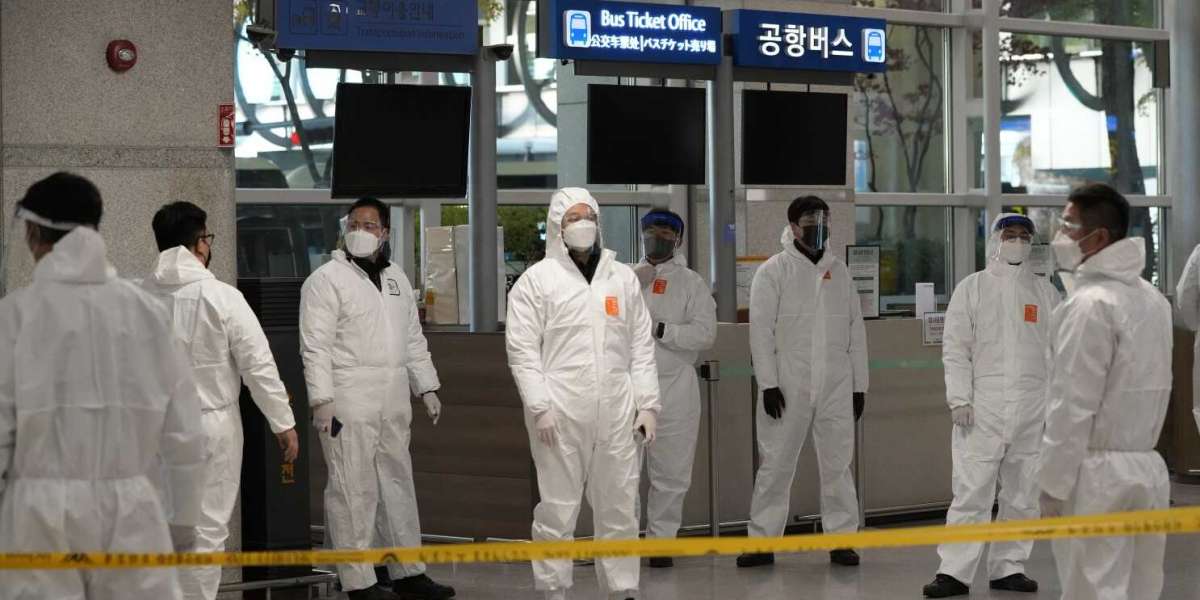According to an expert advising the government, Omicron is spreading through South Korea at a faster rate than previously anticipated, with the potential to cause a greater increase in the number of cases than previously predicted.
Preventive medicine specialist Dr. Jung Jae-hun, who also serves as an adviser to the prime minister on COVID-19, stated on Thursday that the omicron wave is "feared to be worse than previously thought."
Three weeks ago, all of the scenarios modeled by Jung's team predicted more than 10,000 cases a day and up to 2,000 intensive care admissions by March, or as late as late February if restrictions are eased, according to Jung. The Korea Herald reported on Tuesday that he believes it is "entirely feasible" to see as many as 50,000 new cases per day.
The COVID-19 daily peak, according to Jung, who collaborates with leading national health organizations, including the Korea Disease Control and Prevention Agency, on response policies, could reach up to and possibly exceed 100,000 people per day.
In a telephone interview, he explained that the reason for this was that "one, we were not prepared for imported cases to contribute as significantly (as they did) to the spread." In the past week, infection rates among international passengers have reached record highs of more than 300 per day, setting a new high-water mark.
'Given the current global situation, I believe it is safe to assume the majority of them have omicron,' he said, adding that "even if we were able to screen 90 percent of them upon arrival, it is likely that at least 30 people will go on to spread it in the community without our knowledge."
"Omicron maybe 20 percent more transmissible than the previous estimate, which was that it would be 2.8 times more transmissible than delta," he continued.
He went on to say that the calculations for the analysis were still in the process of being completed.
According to Jung, omicron's reduced ability to cause severe disease helps to mitigate the impact of this blow.
Omicron, he said, "is expected to be half as severe as delta," and its severity will be "one-half to one-fifth that of the delta." "However, it's important to note that in Korea, not many people have natural immunity, making it difficult to predict how much less severe the disease will actually be."
On the basis of bed counts, Korea appears to be better prepared now than it was two months ago, when a delta-related peak of more than 7,000 cases per day suffocated hospitals, according to him.
"According to Ministry of Health and Welfare statistics, we now have twice as many critical care beds as we did previously." Assuming that the omicron severity is approximately one-third that of the delta severity, hospitals could withstand a larger outbreak of approximately 40,000 cases (per day)."
Hospitals "will not be able to keep up" after that point, according to him. "At that point, we might have to consider some kind of intervention, such as an emergency stop."
The government has stated that once the country has entered the omicron phase, it will abandon the test, trace, and treatment regimen that has been used to control the pandemic.
Wednesday's total of 6,603 new cases was close to the 7,000-case threshold that had been set by the government for implementing a strategy "tuned to the characteristics of the omicron variant," according to the latest available data.
According to the government's initial announcements, PCR testing, contact tracing, and border screening will be curtailed as part of the omicron strategy. Hospitalization will be reserved for at-risk populations, with the majority of the population recovering at home.
According to Jung, these signals of relaxation of restrictions appear to have accelerated the march of omicron as well.
He stated that increased distribution of Pfizer pills, known as Paxlovid, as well as booster vaccinations, are expected to mitigate the effects of omicron.
Only 39 patients have been prescribed oral antivirals in the three days since approximately 20,000 courses of Paxlovid were delivered to the country from the United States. Compared to the government's promise to deliver the pills to 1,000 patients per day, this is a significant reduction.
With the approaching Seollal holiday, Ministry of Health and Welfare spokesperson Son Young-rae said omicron was "certain" to become dominant in Korea within days. He added that the next three weeks would be a "critical juncture," with the holiday falling on a Thursday.
Following a drop to 12 percent the week before, the proportion of omicron in sequenced samples increased to 26 percent last week. Because omicron's market share is increasing by a factor of two on a weekly basis, it is expected to reach 50 percent sometime this week — the threshold for achieving dominant status.
Son stated that hospitals across the country have enough space to deal with the looming omicron wave, with only about 20% of their intensive care beds currently occupied — down from more than 80% during the December surge in omicron activity. The capacity for PCR testing has been increased to the point where it can perform 700,000 tests per day.
Despite the fact that Son stated that the ministry, along with other concerned government agencies, would "review moving on to the omicron-specific strategy" once the 7-day moving average of cases reached 7,000, President Moon Jae-in called on the Prime Minister's Office and the rest of his Cabinet to "make a shift toward the omicron response strategy promptly" later that same day, according to the Korea Times.
In a written briefing, the president stated that the emergence of omicron as the dominant signal was "an unavoidable reality."
His words were quoted as saying: "The good news, however, is that severe cases are on the decline." "If we work together again this time, as we have in the past, we will be able to overcome the omicron wave."
"The government COVID-19 response headquarters and Cheong Wa Dae are on the same page that the transition will proceed in a speedy and smooth manner," the ministry stated in a press release to reporters regarding conflicting messages regarding the point of shift in response.
"Preparations for the transition to an omicron response are currently underway, and the government will communicate the upcoming changes to the Korean people in the near future," the statement said.



